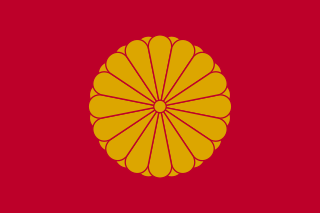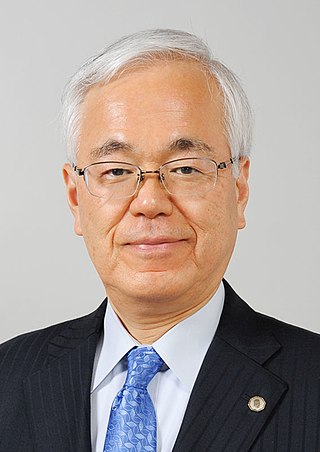Related Research Articles

The emperor of Japan is a constitutionally privileged position established for the hereditary monarch of Japan. Although not being the constitutional head of state, the emperor carries many functions similar to the constitutional monarchs of other countries and remains Japan's internationally recognized head of state. The Imperial Household Law governs the line of imperial succession. Pursuant to his constitutional role as a national symbol, and in accordance with rulings by the Supreme Court of Japan, the emperor is personally immune from prosecution. By virtue of his position as the head of the Imperial House, the emperor is also recognized as the head of the Shinto religion, which holds him to be the direct descendant of the sun goddess Amaterasu. According to tradition, the office of emperor was created in the 7th century BC, but the first historically verifiable emperors appear around the 5th or 6th centuries AD.

Naruhito is Emperor of Japan. He acceded to the Chrysanthemum Throne on 1 May 2019, beginning the Reiwa era, following the abdication of his father, Akihito. He is the 126th monarch according to Japan's traditional order of succession.

The Imperial House is the dynasty and imperial family of Japan, consisting of those members of the extended family of the reigning emperor of Japan who undertake official and public duties. Under the present constitution of Japan, the emperor is "the symbol of the State and of the unity of the people". Other members of the imperial family perform ceremonial and social duties, but have no role in the affairs of government. The duties as an emperor are passed down the line to their male children. The Japanese monarchy is the oldest continuous hereditary monarchy in the world. The imperial dynasty has no name, therefore its current members do not have a family name. However, the house may informally be termed the "House of Yamato".
Events in the year 1992 in Japan. It corresponds to Heisei 4 (平成4年) in the Japanese calendar.

Abdication is the act of formally relinquishing monarchical authority. Abdications have played various roles in the succession procedures of monarchies. While some cultures have viewed abdication as an extreme abandonment of duty, in other societies, abdication was a regular event and helped maintain stability during political succession.

Akihito is a member of the Imperial House of Japan who reigned as the 125th emperor of Japan from 1989 until his abdication in 2019. The era of his rule was named the Heisei (平成) era, Heisei being an expression of achieving peace worldwide.
Katsuya Uga is a Japanese jurist who has served as an associate justice of the Supreme Court of Japan since 2019.
Hiroyuki Kanno is a Japanese jurist who served as an associate Justice of the Supreme Court of Japan from 2016 to 2022.

Saburo Tokura is a Japanese jurist who served as the 20th Chief Justice of Japan from 2022 to 2024, having previously served as an Associate Justice on the Supreme Court of Japan from 2017 to 2022.
Katsuyuki Kizawa is a Japanese jurist who served as an associate Justice of the Supreme Court of Japan from 2016 to 2021.
Michiharu Hayashi is a Japanese jurist who has served as an associate Justice of the Supreme Court of Japan since 2019.
Masayuki Ikegami is a Japanese jurist who served as an associate Justice of the Supreme Court of Japan from 2014 to 2021.

Yasumasa Nagamine is a Japanese jurist who has served as an associate justice of the Supreme Court of Japan since 2021.
Mamoru Miura is a Japanese jurist who has served as an associate Justice of the Supreme Court of Japan since 2018.
Koichi Kusano is a Japanese jurist who has served as an associate justice of the Supreme Court of Japan since 2019.
Kazumi Okamura is a Japanese jurist who has served as an associate justice of the Supreme Court of Japan since 2019.
Ryosuke Yasunami is a Japanese jurist who has served as an associate Justice of the Supreme Court of Japan since 2021.
Akira Ojima is a Japanese jurist who has served as an associate Justice of the Supreme Court of Japan since 2022.
Masaki Ota is a Japanese jurist who has served as an associate Justice of the Supreme Court of Japan since 2021.

Toru Sakai is a Japanese jurist who has served as an associate Justice of the Supreme Court of Japan since 2021.
References
- 1 2 "MIYAMA Takuya | 裁判所 - Courts in Japan". www.courts.go.jp. Retrieved 2021-08-08.
- ↑ "Akihito | Biography, Reign, & Facts". Encyclopedia Britannica. Retrieved 2021-08-08.
- 1 2 "Supreme Court of Japan | Japanese government". Encyclopedia Britannica. Retrieved 2021-08-08.
This article needs additional or more specific categories .(August 2021) |